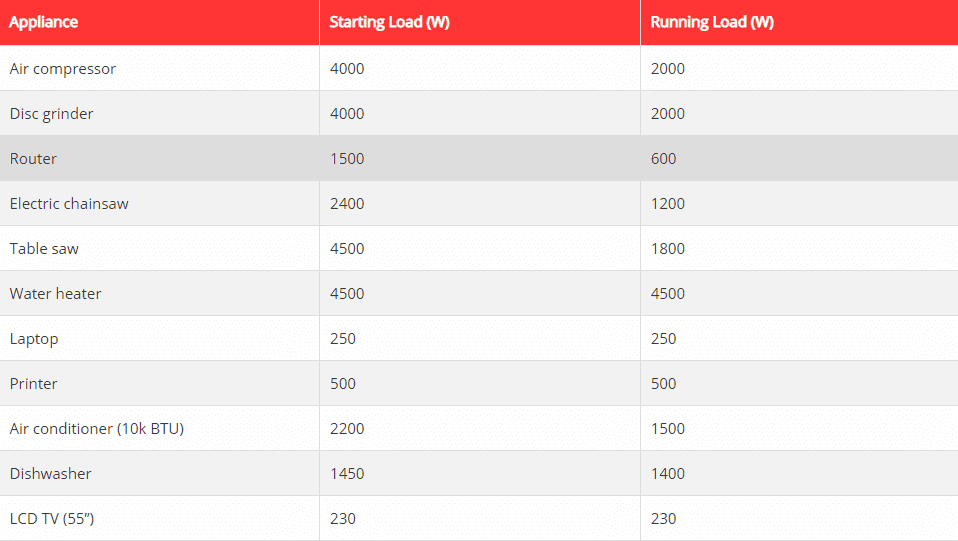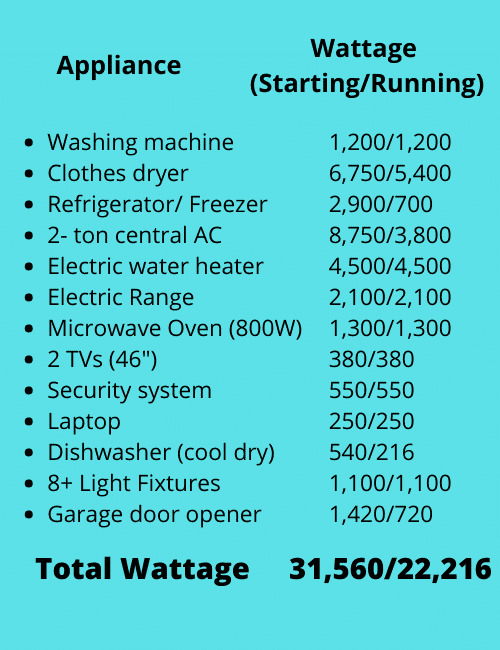
-
“I want to thank the entire AirPlus team for their professionalism, knowledgeable staff, and willingness to accommodate my service needs.” - Lance B.

The size of your home and the things you need to power will likely determine the type of generator you choose. Just the most essential appliances such as the refrigerator, heat, and water will require at least 5,000 to 7,500 watts in the typical home. You can actually survive a power outage with a portable home generator, but there are other alternatives that can power your entire house. If you’re looking for full power, you will want to invest in at least a 20,000-watt generator; this also goes for people with exceptionally large homes or families, which will use much more power than, say, a two- or three-person household.
To calculate what size generator you need to power your whole home, follow these 3 steps:
Step 1: Start by making a list of the most important circuits in your home. These include refrigerators and freezers, central air and furnace, sump pumps, well pumps, and medical equipment.
Step 2: Determine the starting and running wattage of everything on your list. If you can’t find these numbers on the appliance label, you can use this:
Note: Starting wattage (sometimes known as “surge wattage”) is the amount of power required to start an appliance. The starting wattage of an appliance is usually 2-3 times larger than the “running” wattage, or how many watts it requires to operate continuously.
Step 3: The generator size is easy to pick once you know the approximate power required.Choose a generator with a capacity that is 10-20% more than your demand, whichever number you come up with. This will provide you some flexibility or room if you decide to upgrade your equipment and find that you require additional power as a consequence. It also aids in the management of “de-rating,” or the generator’s underperformance compared to its manufacturer’s declared capabilities owing to harsh operating circumstances such as high altitudes or severe temperatures.
Note: Always remember that a DIY wattage estimate is just that: a guess. To be safe, use a wattage calculatoror, better yet, have a professional electriciandetermine the precise wattage you require to assist you in selecting the appropriate generator size.
If you want to power pretty much everything in your house, your list should look something like this:
It’s also crucial to keep in mind that even while generators are undoubtedly an expensive investment, they will stand the test of time. Most home standby generators can run anywhere from 10,000 to 30,000 hours. If you were to use it for 100 hours per year, that translates to 10 to 30 years.

Additional terms and conditions may apply, call for details. Valid from Jun 1, 2024 - Dec 31, 2024
There are three basic types of generators you'll want to consider when selecting a new home generator. These include whole house, portable, and inverter generators.
- Inverter generators are ideal for camping, boating and other recreational activities. They operate quieter than other generators and provide power for lights, heaters, fans, radios, smart phones and more.
- Whole house generators (standby generators) are the best generators for home use. They are designed to provide ample power for your appliances and HVAC systems.
- Portable generators are often used on job sites to power air compressors, nail guns, saws, hammer drills and other equipment. Most are loud, but there are quiet portable generators too.
Once you have chosen the type of emergency generator that you need, you must choose the fuel type it will run on. There are three types of fuel options:
Gasoline: Gasoline is the most widely used fuel for a portable generator. The fuel’s ease of purchase at any gas station is by far its greatest benefit. However, it isn’t always accessible in times of need. If a power outage strikes your whole area, not just your house, gas stations won’t be able to use electricity to pump their gas.
This means that if you have a generator that runs on gasoline, you must always have a sufficient quantity of fuel on hand. But it’s not always simple to do that. Large quantities of gasoline stored on your property are prohibited by many local fire departments because they pose a fire risk. Family Handyman claims that the maximum is typically 25 gallons.
The Chainsaw Journal also claims that gasoline degrades with time. Gas with ethanol, which makes up the majority of today’s gas sold, often only lasts one month. Its lifespan can be extended to a year by adding a fuel stabiliser, but you’ll still need to replace your full supply every year.
Additionally, using gasoline can be inconvenient because you need to use a funnel to fill the generator from a can, and it emits unpleasant smells. The cost of running a gas generator is determined by the cost of gasoline in your location because gasoline prices vary greatly from place to place.
Propane Propane is a fuel that is sold in tanks at big-box retailers like Home Depot and Walmart, and sometimes in supermarket and convenience stores. These fuels can be used to power both portable and standby generators. Propane isn’t always as simple to purchase as gasoline because, in many locations, you can’t just head to the closest gas station for it. It lasts practically forever, which is a bonus, and is safer to keep.
Compared to gasoline, propane burns cleaner. According to research from the U.S. Energy Information Administration, not only is there no offensive odor, but it also emits less CO2 for the same amount of heat.
Propane presently costs around $2 per gallon, which is less than the average gallon price for gasoline, according to the EIA. However, as this graph from the Alternative Fuels Data Center demonstrates, propane only generates around 73% as much energy as gas, making it more expensive to use. Portable generators that run on propane last longer and are less expensive to maintain than those that run on gasoline.
The fact that the tank can’t always maintain adequate pressure to keep the fuel flowing in extremely cold temperatures is a significant drawback of propane. According to Ehrhart Energy, residents in cold climates need to make sure to fill their propane tanks at least one-quarter full in order to avoid this issue.
Natural Gas
If you decide on a standby generator and your house is already heated with natural gas, you may connect the generator to your gas lines with ease. Although natural gas is typically less expensive than propane, its biggest benefit is ease. There is no requirement to purchase and store gasoline or to replenish the generator whenever it needs it. You always have a supply coming via the pipes.
However, using natural gas with portable generators is not an option and is not feasible if you don’t have access to it at home.
Depending on whether you want a residential generator only for intermittent emergency backup or one that can handle some or all of your power needs on a regular basis, you’ll definitely want to consider some good features and a particular type of home generator before writing that check. The features listed here are the most important to consider before pulling the trigger on a purchase.
- Electric Start: Pull cords are typically used to start portable generators. However, some have a push-button battery starter that makes starting the vehicle easier. The battery can cost an additional $50 or more because it isn’t always included with the generator.
- Gauges: You can quickly see how much fuel is remaining in a portable generator’s tank thanks to a fuel gauge. It comes in handy when there are protracted power outages because you’ll probably need to recharge it multiple times. An hour meter, which records how many hours the device has ran, is another helpful metric. That lets you know when to change the oil or do other regular maintenance.
- Low Oil Shutoff: By turning off the generator if the oil level falls too low, this feature guards against harm to the generator. Most stationary generators come with it as standard equipment, although many portable units also have it.
- Automatic CO Shutoff: Carbon monoxide (CO) sensors are frequently included into more recent generators. If the CO concentration rises to a hazardous level, a switch is tripped, and the generator is turned off. Consumer Reports claims that Generac, Cat, and DeWalt generators all have this feature. Low-CO engines are available from several generator manufacturers, including Ryobi and Echo, to lower the possibility of carbon monoxide poisoning.
- Multiple Outlets: If your generator isn’t hooked up to your household electrical panel with a transfer switch, you need one with multiple outlets so you can plug in several devices at once. Most portable generators have at least two electrical outlets, and some have four or more.
- Dual-Fuel Use: Most portable generators only use gasoline or propane as fuel. The most adaptable types, referred to as dual-fuel generators, can use either fuel source. According to Portable Generator Grader, this feature raises the price of a generator by roughly $100. Tri-fuel generators are even available, but they are quite uncommon and may run on gasoline, propane, or natural gas.
- Inverter Technology: Power surges can occur occasionally with most portable generators. Most appliances are unaffected by these, but delicate electrical devices may be harmed. By converting the generator’s alternating current (AC) to direct current (DC), smoothing out any surges, and then back to AC, generators with built-in inverters get around this issue. Inverter generators are often more compact, lighter, fuel-efficient, and quieter than other portable generators, according to Honda. They do have a high price tag and a low production, though. Only 2,000 watts of power are generated by a standard $1,000 inverter generator.
Performance
Our skilled experts load up each model of generator with a range of necessities such as a space heater, refrigerator, or window air conditioner in order to test each one for performance. We test the generator to make sure it can support the load it claims to be able to manage. We also evaluate what will happen in the event of a rapid spike in voltage, such as what would occur if the compressor in your refrigerator turned on while the generator was already nearly at capacity. The greatest models deal with that without complaining, but others struggle or even stop. We also consider a generator’s portability, ease of operation, fuel efficiency, and the amount of time it can operate on a single tank.
Safety
We put each generator through a series of tests meant to simulate the various ways a user may unintentionally abuse a generator. When a generator is running, we measure the levels of carbon monoxide (CO) throughout the vessel using calibrated CO sensors. We also note how soon each generator shuts down when the levels reach potentially hazardous levels.
Generac adheres to a vertically integrated philosophy, customers can get a generator system designed, manufactured and supported by a single source. All parts of the production and testing process are controlled by Generac. The results? Shorter lead times and high quality standards. With alternators, enclosures, control systems, fuel tanks, communications software and engines all engineered to do one thing: provide power that a facility needs to achieve its mission. This approach ensures generator systems meet the highest reliability and performance standards. Email or call us at (703) 634-5400 to arrange a free on-site estimate!
What size home generator do I need?
A minimum of 5,000 to 7,500 watts are required to power the essential electrical requirements of the typical American home. Because of this, standby generators typically offer between 9kW and 20kW. Power capacities for typical whole-house generators start around 22,000 watts and increase from there, typically peaking at close to 50,000 watts.
Why buy a home generator from AirPlus?
The AirPlus Heating, Cooling & Electrical team is well known for providing excellent service, doing each job right the first time, on time and within budget. Thousands of satisfied customers in the region have come to see that our work is clean, precise and of course, guaranteed.
How do you install a home generator?
Installing your own standby generator is not your run-of-the-mill DIY project. Unlike changing the oil filter in your car or tiling the spare bathroom, home generator installation includes electrical wiring, plumbing and natural gas components. Contact Airplus to book an appointment.
Why does AirPlus choose Generac generators?
Because Generac adheres to a vertically integrated philosophy, customers can get a generator system designed, manufactured and supported by a single source. All parts of the production and testing process are controlled by Generac.
What are some of the other popular home generator brands?
AirPlus offers free in-home assessments so that you will know the exact cost of your home generator installation upfront. AirPlus will listen to your generator.
How long does a home generator last?
On average, a standby generator can run for up to 3,000 hours powering a medium-sized home, though it is recommended you do not run a generator for longer than 500 hours continuously.

Contact Airplus Today
Servicing All BrandsOur team is here to answer your questions. Contact us today at (571) 470-7235 or complete the form below.
.2309121422550.png)


